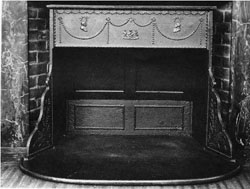Ben Franklin Stove
|
| updated |
Copy Link Code
|
 Many people know Benjamin Franklin was not only a Founding Father but also an avid inventor and man of ideas. What some people don't know is that he did this purely out of the joy of making life better for everyone and the Ben Franklin Stove is a perfect example of this sentiment. In 1741, Franklin began working on the design of a more efficient fireplace for colonial homes. Franklin's aim was to limit the amount of smoke that poured into the home and maximize the amount of heat captured from the fire. He was not the first inventor to consider the use of such a thing, and much of his own work would be based on prior discoveries and research of European inventors, including from German scientists who described their inventions over 100 years before. The Ben Franklin Stoves were mostly an amalgamation of key concepts he found in a book from 1713 by the French scientist Nicolas Gauger and scientific research published by the Dutch physician Herman Boerhaave around the same time.
Many people know Benjamin Franklin was not only a Founding Father but also an avid inventor and man of ideas. What some people don't know is that he did this purely out of the joy of making life better for everyone and the Ben Franklin Stove is a perfect example of this sentiment. In 1741, Franklin began working on the design of a more efficient fireplace for colonial homes. Franklin's aim was to limit the amount of smoke that poured into the home and maximize the amount of heat captured from the fire. He was not the first inventor to consider the use of such a thing, and much of his own work would be based on prior discoveries and research of European inventors, including from German scientists who described their inventions over 100 years before. The Ben Franklin Stoves were mostly an amalgamation of key concepts he found in a book from 1713 by the French scientist Nicolas Gauger and scientific research published by the Dutch physician Herman Boerhaave around the same time.
In 1742, Benjamin Franklin announced his invention. It was a cast-iron fireplace with a hollow baffle and an inverted syphon in the rear that pulled the smoke and heat down below the floor before exiting up through the chimney. This flue allowed more heat to remain in the home and the hollow baffle would create a draft that pulled the smoke and heat through the syphon. Unfortunately, the flue system also had a drawback which ultimately hindered the number of sales for Benjamin Franklin Stoves; because the flue brought cold air into the rear of the fireplace, the smoke often cooled too much before it reached the chimney, destroying the draft which the baffle was designed to create. It was certainly not Franklin's greatest invention but he did hope that it would help his fellow colonial subjects and reduce the amount of wood they needed to burn as well as reducing the frequency of house fires.
Before the success or failure had been foreseen, the Governor of Pennsylvania had offered Ben Franklin a patent for his invention. Franklin refused as he was not in the invention game for profit. His reply to the Governor became famous; Franklin believed "that as we enjoy great advantages from the inventions of others, we should be glad of an opportunity to serve others by an invention of ours, and this we should do freely and generously." We can not confuse this kind of generosity with weakness; Franklin was a cunning man who warned others of the danger of debt and the lure of money. He understood what was valuable in life and knew that giving so much would often mean receiving more in return. Although the Ben Franklin Stove did not work out as he had imagined, his effort was noble and his audacity to change something so central to everyday life must be admired. As a note of his modesty, it is important to know that he did not name the stove after himself and preferred it to be known as the "Pennsylvania Stove." These are still available for purchase and installation.
